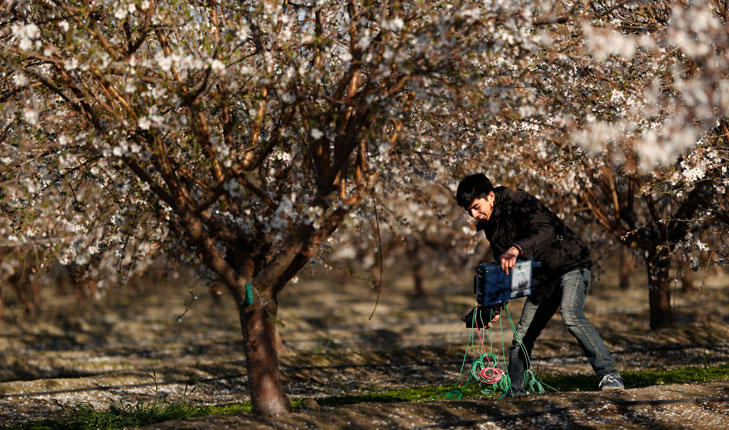California’s vast Central Valley has long been globally recognized for its distinctive agricultural economy, one that produces hundreds of commodities valued at billions of dollars every year. The region feeds the nation, growing more than half its fruits and nuts and one-third its vegetables.
Still, the Valley is considered a slow-growth economy that struggles with innovation and commercialization. Many of the region’s residents live below the poverty line, experiencing food hardship and racial inequity in an area with some of the worst air and water in the nation.
Changing these conditions is what Valley community and education leaders call a “national imperative” and the focus of the Fresno-Merced Future of Food Innovation Coalition, or F3, which was recently awarded $65.1 million in federal funding. F3 was the largest awarded under the $1 billion Build Back Better Regional Challenge, funded by President Joe Biden’s American Rescue Plan and administered by the Commerce Department’s Economic Development Administration (EDA).
It is also the largest federal grant ever awarded to the Central Valley. The EDA received 529 applications from all 50 states and five territories, with 21 coalitions selected from 60 finalists.
Fresno State is one of almost two dozen coalition partners and will play a key role in the transformational initiative, one that aims to rebuild the regional economy, promote inclusive and equitable recovery and create good paying jobs in “industries of the future, such as clean energy, next-generation manufacturing and biotechnology,” according to the EDA’s website.
“We have world-leading institutions, we have university partners, we have community college partners, we have industry at the table, we have small farms at the table, we have workers at the table,” said Ashley Swearengin, former mayor of Fresno and president and chief executive officer of the Central Valley Community Foundation, during a news conference.
“In my 25 years of doing community and economic development work, I never thought we would get to this moment, the moment where we have all the ingredients to transform our economy,” Swearengin said.
F3 operates under the Fresno DRIVE initiative (Developing the Region’s Inclusive and Vibrant Economy), a 10-year community investment plan sponsored by the Central Valley Community Foundation.
Over the next four years, F3 aims to increase regional gross domestic product from 2.1% to 3% annually; attract $250 million in private investment; and create and/or fill more than 10,000 quality jobs. The grant funds will spur economic growth and equity in several areas like workforce development, microbusiness financing and research and development innovation.
Several interrelated projects comprise F3, all of which “intentionally include small farmers and farmworkers in the innovation process,” according to an October 2021 Central Valley Community Foundation report. One key component is a workforce development initiative (Ag TEC) that aims to train over 4,700 agrifood tech and engineering workers every year.
The flagship project is the Innovation Center for Research and Entrepreneurship in Ag Food Technology and Engineering (iCREATE), which is where Fresno State will focus its resources.
“iCREATE is where our biggest connection is,” said Dr. Ram Nunna, dean of the Lyles College of Engineering at Fresno State. “We are co-leads in that effort.”
iCREATE centers on four programmatic pillars – industry leadership and global identity;
innovation; commercialization and business acceleration; and talent pipeline coordination. iCREATE will be a public-private partnership anchored by industry; Fresno State; University of California, Merced; University of California Agriculture and Natural Resources; the California Department of Food and Agriculture; the Central Valley Community Foundation; and 2,400 acres of test farms. EDA funding will seed proof-of-concept economic activity that will catalyze other investments.
“iCREATE is a vision to foster research and development of new products and services meant to support industry and help farmers innovate,” Nunna said. “iCREATE aims to integrate the Central Valley’s ag and food manufacturing resources and commercialize climate-smart food and agricultural technology.”
Aspirational goals for iCREATE include 75 new industry-university partnerships and 100 agrifood tech innovations with a 40% commercialization rate. There is also a goal for a brick-and-mortar headquarters for iCREATE in downtown Fresno, one that will have a “significant presence in a historical building,” added Nunna.
Fresno State’s faculty, researchers and students from the College of Science and Mathematics, Jordan College of Agricultural Sciences and Technology and the Lyles College will be key participants and drivers of the research and innovation for iCREATE. In addition to providing support for faculty and student researchers, the EDA’s investment will also help jumpstart the Center for Engineering Innovation and Design, a new Fresno State-based entity that will serve as research and development partner to regional industry and iCREATE.
“Fresno State is excited to participate as a full partner in this important effort,” said Fresno State President Dr. Saùl Jimènez-Sandoval. “F3 establishes the foundation for the farmer of the future and plays a vital role in helping our Valley address the challenges of producing 60% more food by the year 2050.”





